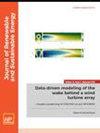风电场风速缺失数据恢复:一种时空张量分解方法
IF 1.9
4区 工程技术
Q4 ENERGY & FUELS
引用次数: 1
摘要
缺失数据恢复在提高风电场风速数据质量方面发挥着至关重要的作用,已经提出了许多方法来解决这一问题。然而,它们中的大多数都无法充分利用已知数据的信息,因此,通常会实现较差的恢复性能。在本文中,我们提出了一种基于时空张量分解的丢失数据恢复方法。该方法基于离散小波变换对整个数据进行重新排列,构建了一个“场地×周×尺度×小时”的四维张量,用于表示风速的时空相关性。基于Tucker分解和非线性共轭梯度算法,估计了一个完整性张量来估算缺失数据。该方法不仅继承了基于矩阵模式的插补方法的优点,而且很好地挖掘了风速的时空内在相关性。利用风电场的风速数据验证了该方法的有效性。结果表明,与传统方法相比,该方法以更小的平均绝对误差和均方根误差恢复丢失数据,并且需要更少的精力来恢复碎片或连续的丢失数据。本文章由计算机程序翻译,如有差异,请以英文原文为准。
Missing data recovery of wind speed in wind farms: A spatial-temporal tensor decomposition approach
Missing data recovery plays a critical role in improving the data quality of wind speed in wind farms, and numerous methods have been proposed to address this issue. However, most of them suffer from the inability to fully use the information of known data, and thus, poor performance of recovery is usually achieved. In this paper, we propose a missing data recovery method based on spatial-temporal tensor decomposition. The proposed method rearranges the whole data based on discrete wavelet transform to construct a four-dimensional tensor of “site × week × scale × hour” for representing the spatial and temporal correlation of wind speed. A completeness tensor is estimated to impute missing data based on Tucker decomposition and the nonlinear conjugate gradient algorithm. The proposed method not only inherits the advantages of imputation methods based on the matrix pattern but also well mines the spatial and temporal inherent correlation of wind speed. Wind speed data of a wind farm are used to verify the effectiveness of the proposed method. The results show that the proposed method recovers missing data with much smaller mean absolute error and root mean square error and requires less effort for recovering missing data of fragmented or continuously, compared with the traditional methods.
求助全文
通过发布文献求助,成功后即可免费获取论文全文。
去求助
来源期刊

Journal of Renewable and Sustainable Energy
ENERGY & FUELS-ENERGY & FUELS
CiteScore
4.30
自引率
12.00%
发文量
122
审稿时长
4.2 months
期刊介绍:
The Journal of Renewable and Sustainable Energy (JRSE) is an interdisciplinary, peer-reviewed journal covering all areas of renewable and sustainable energy relevant to the physical science and engineering communities. The interdisciplinary approach of the publication ensures that the editors draw from researchers worldwide in a diverse range of fields.
Topics covered include:
Renewable energy economics and policy
Renewable energy resource assessment
Solar energy: photovoltaics, solar thermal energy, solar energy for fuels
Wind energy: wind farms, rotors and blades, on- and offshore wind conditions, aerodynamics, fluid dynamics
Bioenergy: biofuels, biomass conversion, artificial photosynthesis
Distributed energy generation: rooftop PV, distributed fuel cells, distributed wind, micro-hydrogen power generation
Power distribution & systems modeling: power electronics and controls, smart grid
Energy efficient buildings: smart windows, PV, wind, power management
Energy conversion: flexoelectric, piezoelectric, thermoelectric, other technologies
Energy storage: batteries, supercapacitors, hydrogen storage, other fuels
Fuel cells: proton exchange membrane cells, solid oxide cells, hybrid fuel cells, other
Marine and hydroelectric energy: dams, tides, waves, other
Transportation: alternative vehicle technologies, plug-in technologies, other
Geothermal energy
 求助内容:
求助内容: 应助结果提醒方式:
应助结果提醒方式:


